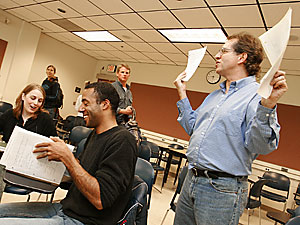 |
|
EVAN CARAVELLI/Arizona Daily Wildcat
|
Associate professor Pat Willerton jokes with students in his political elites class last night in the BioSciences West building. Willerton received the Provost's General Education Teaching Award last spring.
|
|
|
By Andrew O'Neill
Arizona Daily Wildcat
Wednesday, February 2, 2005
Print this
It all began in Columbus, Ohio.
He was drawn to Russian music at 13. He discovered Russian literature at 14. He majored in Russian in college, followed by a Ph.D. in political science. There was no turning back.
Since 1988, Pat Willerton has shared his passion for all things Russian with scores of students as an associate professor of political science at the UA. Willerton teaches courses in comparative politics, Russian foreign policy, Russian domestic politics and comparative political elites.
Although some of his courses involve the study of several foreign governments, Russia remains his primary passion.
"Russia has always been a tremendous mystery to me," Willerton said.
Willerton said Russia is a very sophisticated country with a rich cultural heritage and said he does not see it as an "enemy" of the United States, as it has been portrayed in the media, especially during the Cold War.
This semester, Willerton is teaching an upper-division course in comparative political elites. He said the class involves the study of Russian politics but also gives him the opportunity to pursue interests in other countries, especially France and Iran.
"I like to study enemies," Willerton joked.
Willerton said he was alluding to recent events, which have placed these two countries at odds politically with the United States.
Willerton said he tries to show the similarities as well as the differences between the United States and Iran. He said, for example, both countries were founded on strong religious principles, Christianity and Islam, respectively.
Also, both countries have specific ideas about democracy and church-state relations, although each country has followed a different path on these issues, he said.
Willerton's students say they have learned a lot from comparative political elites, a seminar class with more than 40 students.
"I enjoy it very much," said Matt Stone, and international studies and economics junior.
Stone said Russia is the country he is focusing on in his major and said he appreciates Willerton's expertise.
"He always has new information to expand upon, and he really likes what he is teaching," Stone said.
Other students also admire Willerton's enthusiasm for his subject matter.
"He's so charismatic. You never get bored, even though it's a two-and-a-half-hour class," said Lyndall Herman, a political science and Near Eastern studies junior.
She said Willerton helps students form their own opinions about the role of various organizations in government and answers every question students have. Willerton treats each question seriously and gives students the respect they deserve, Herman said.
Some students even credit Willerton with helping them choose a major.
"I took his comparative politics class and that got me interested in political science in the first place," said Thomas Schuyler, a political science junior.
Schuyler said he is impressed with Willerton's teaching style and he might be interested in taking one of Willerton's courses on Russian politics in the future.
"He is very energetic in his lectures," Schuyler said.
Schuyler said while Willerton sometimes goes off on tangents, these tangents are interesting by themselves and keep students interested in the subject matter. Willerton's reputation as a popular professor is not only confined to the student population.
Last spring, Willerton was one of the recipients of the Provost's General Education Teaching Award for his course in comparative politics.
Willerton said he prefers to think of himself as a "facilitator," not just a professor or instructor.
He said he hopes students come away from his classes as people who can think critically and independently about world issues and who are not afraid to challenge common wisdom.
He said he is proud to call himself an "internationalist," and hopes the United States and Russia will soon engage in a meaningful dialogue emphasizing similarities between the two countries, with less emphasis on what divides them.
"We have much to offer, but we also have much to learn," Willerton said.
